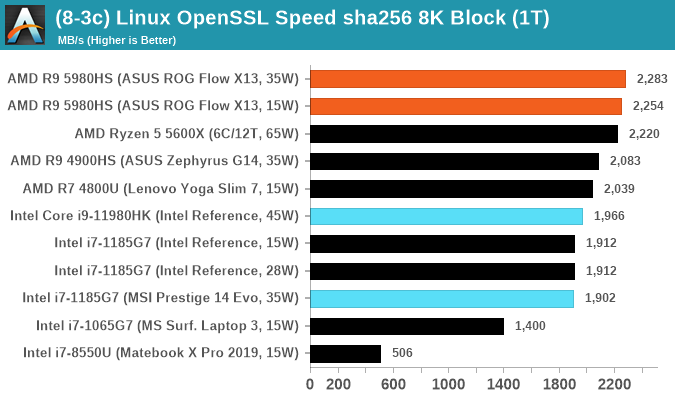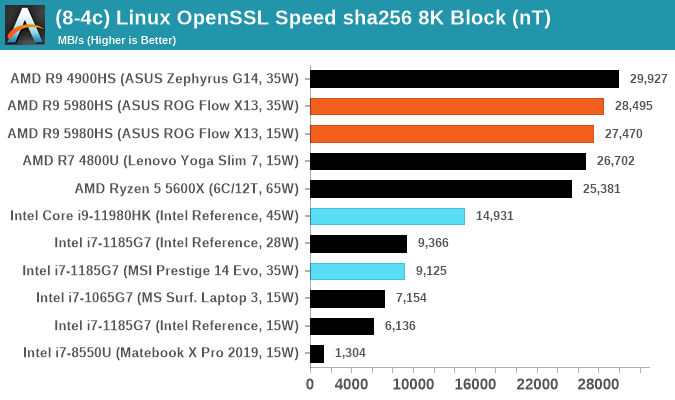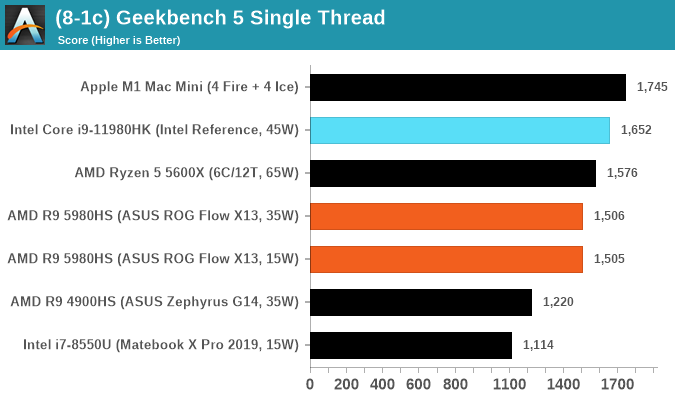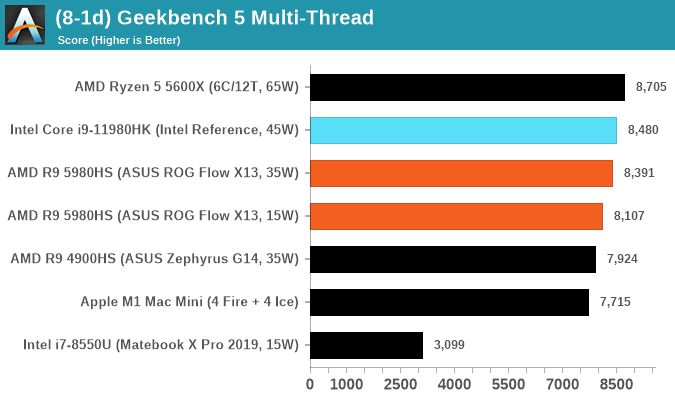Intel 11th Generation Core Tiger Lake-H Performance Review: Fast and Power Hungry
by Brett Howse & Andrei Frumusanu on May 17, 2021 9:00 AM EST- Posted in
- CPUs
- Intel
- 10nm
- Willow Cove
- SuperFin
- 11th Gen
- Tiger Lake-H
CPU Tests: Synthetic
Most of the people in our industry have a love/hate relationship when it comes to synthetic tests. On the one hand, they’re often good for quick summaries of performance and are easy to use, but most of the time the tests aren’t related to any real software. Synthetic tests are often very good at burrowing down to a specific set of instructions and maximizing the performance out of those. Due to requests from a number of our readers, we have the following synthetic tests.
Linux OpenSSL Speed: SHA256
One of our readers reached out in early 2020 and stated that he was interested in looking at OpenSSL hashing rates in Linux. Luckily OpenSSL in Linux has a function called ‘speed’ that allows the user to determine how fast the system is for any given hashing algorithm, as well as signing and verifying messages.
OpenSSL offers a lot of algorithms to choose from, and based on a quick Twitter poll, we narrowed it down to the following:
- rsa2048 sign and rsa2048 verify
- sha256 at 8K block size
- md5 at 8K block size
For each of these tests, we run them in single thread and multithreaded mode. All the graphs are in our benchmark database, Bench, and we use the sha256 results in published reviews.


GeekBench 5: Link
As a common tool for cross-platform testing between mobile, PC, and Mac, GeekBench is an ultimate exercise in synthetic testing across a range of algorithms looking for peak throughput. Tests include encryption, compression, fast Fourier transform, memory operations, n-body physics, matrix operations, histogram manipulation, and HTML parsing.
Unfortunately we are not going to include the Intel GB5 results in this review, although you can find them inside our benchmark database. The reason behind this is down to AVX512 acceleration of GB5's AES test - this causes a substantial performance difference in single threaded workloads that thus sub-test completely skews any of Intel's results to the point of literal absurdity. AES is not that important of a real-world workload, so the fact that it obscures the rest of GB5's subtests makes overall score comparisons to Intel CPUs with AVX512 installed irrelevant to draw any conclusions. This is also important for future comparisons of Intel CPUs, such as Rocket Lake, which will have AVX512 installed. Users should ask to see the sub-test scores, or a version of GB5 where the AES test is removed.


To clarify the point on AES. The Core i9-10900K scores 1878 in the AES test, while 1185G7 scores 4149. While we're not necessarily against the use of accelerators especially given that the future is going to be based on how many and how efficient these accelerators work (we can argue whether AVX-512 is efficient compared to dedicated silicon), the issue stems from a combi-test like GeekBench in which it condenses several different (around 20) tests into a single number from which conclusions are meant to be drawn. If one test gets accelerated enough to skew the end result, then rather than being a representation of a set of tests, that one single test becomes the conclusion at the behest of the others, and it's at that point the test should be removed and put on its own. GeekBench 4 had memory tests that were removed for Geekbench 5 for similar reasons, and should there be a sixth GeekBench iteraction, our recommendation is that the cryptography is removed for similar reasons. There are 100s of cryptography algorithms to optimize for, but in the event where a popular tests focuses on a single algorithm, that then becomes an optimization target and becomes meaningless when the broader ecosystem overwhelmingly uses other cryptography algorithms.










229 Comments
View All Comments
mode_13h - Monday, May 17, 2021 - link
That's clearly not a M.2 drive and therefore not a laptop. Please reread my question.xpclient - Tuesday, May 18, 2021 - link
It is from an M.2 gen 4 drive in a gaming laptop - ASUS ROG Zephyrus S17 GX703 (GX703HS model – Core i9 11900H + RTX 3080 140W, 4K 120Hz screen) but I get your point - at the moment, not many will need such speeds. Gen 3 will serve them fine. Please do not question the benchmark itself. Personally I got an AMD Ryzen 7 5800H-based machine myself, without waiting for Tiger Lake H45.mode_13h - Tuesday, May 18, 2021 - link
xpclient> It is from an M.2 gen 4 drive in a gaming laptop - ASUS ROG Zephyrus S17 GX703xpclient> (GX703HS model – Core i9 11900H + RTX 3080 140W, 4K 120Hz screen)
BS. Look at the numbers: you cannot do 10.5 GB/s read or 9.8 GB/s write over PCIe 4.0 x4.
I don't know what it's from, but it's no mere x4 drive. Maybe a 4-drive RAID-0 or something like that.
Spunjji - Tuesday, May 18, 2021 - link
@mode_13 Those scores are from a laptop that comes with a 3-drive RAID-0 config, which is - quite frankly - an absurd setup to have by default for a gaming system.mode_13h - Tuesday, May 18, 2021 - link
spunji> Those scores are from a laptop that comes with a 3-drive RAID-0 configWow, so I was actually close!
> which is - quite frankly - an absurd setup to have by default for a gaming system.
Yeah, I'd say a 3-drive RAID-5 might make sense in a mobile workstation for editing digital cinema footage on-location.
xpclient - Wednesday, May 19, 2021 - link
@mode_13h and @Spunjji, my apologies. I didn't notice the 3 drive RAID config in that review article of an ASUS laptop and missed that completely. My bad.mode_13h - Thursday, May 20, 2021 - link
> my apologies.No problem. It did spark an interesting tangent about RAID in laptops.
Thanks for the follow-up. It's a good idea to sanity-check the numbers, since that's what first caught my attention.
Spunjji - Thursday, May 20, 2021 - link
@xpclient - no harm no foul!Bagheera - Tuesday, May 18, 2021 - link
let's not forget that Intel was 2 years late to PCIe4 on DESKTOP and Intel fans didn't seem to mind.mode_13h - Tuesday, May 18, 2021 - link
> let's not forget that Intel was 2 years late to PCIe4 on DESKTOPIt's there now. If you weren't in the market for a new PC in the past 2 years, what does it matter?
> and Intel fans didn't seem to mind.
Not even just Intel fans. AMD was early with their PCIe 4, on the desktop. That's why they caught Intel by surprise. Because, at the time, PCIe 3 was good enough. We're only just starting to see some minor advantages for PCIe 4, on the desktop. It's no game changer.
Honestly, of all the criticisms you could make of Intel, this is one of the weaker ones.